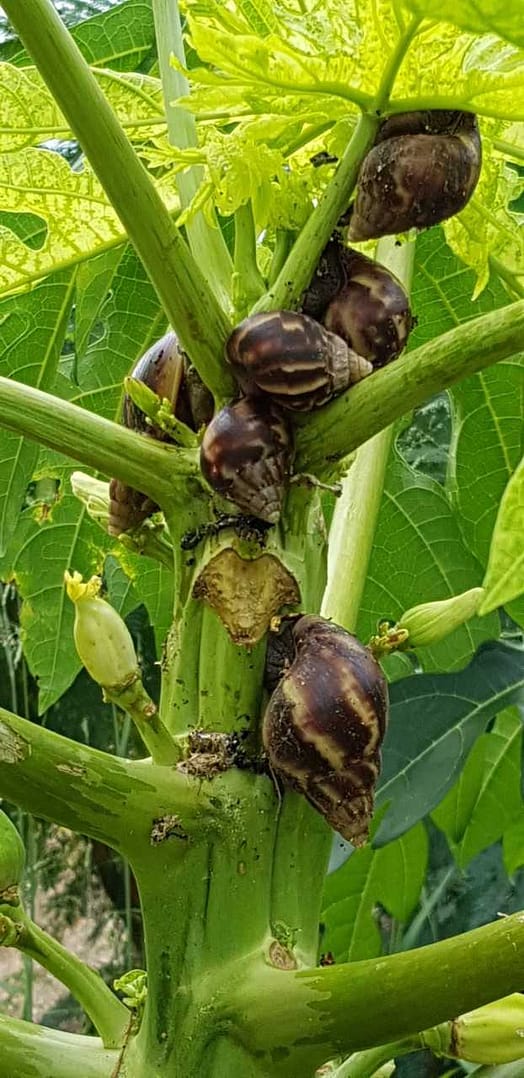
(PUBLIC NOTICE)
The general public is reminded that the Giant African Snail problem is a
national one of mammoth proportions.
• All home owners in infested areas must take responsibility for collecting
and killing snails found on their property.
• Land owners must ensure that unoccupied lands do not become
overgrown and provide refuge and breeding grounds for this invasive pest.
• Communities must work together for best effect.
• Farmers should keep their farms free from excess bushes and debris that
harbor the snails.
• To help prevent further spread, movement of top soil, ghaut sand, and other
such material from infested areas MUST be with permission from Plant
Protection.
With the recent rains, the Giant African Snail is expected to be very active, with
population expected to peek by September. Therefore, be reminded of the following
ten (10) point management and safety plan:
1. With gloved or covered hands, collect all sizes of Giant African Snails, dead or
alive, and place them in a garbage bag or container. Pour salt on the snails, then
cover or tie the container to prevent escape. Always wash hands with warm,
soapy water after handling snails.
2. Snails hide at the roots of high grass or in bushy areas. They also seek refuge in
heaps of debris and garbage. In wet conditions, snails climb up on fences and the
walls of houses. Remove and collect snails from walls. Where possible,
remove all snail hiding places from the infested area.
3. Do not play with the snails or use them as pets.
4. Eggs should be crushed or scooped into the collection container.
5. Seek advice from Plant Protection on whether your location is suitable to be
treated with molluscicide (i.e., snail bait). If approved, purchase the chemical in
its original packaging that clearly states the use and safety instructions. Plant
Protection can assist with the safe application of the bait.
6. Always thoroughly wash fresh fruit and vegetables from infested areas before
consuming.
7. Do NOT move infested material, including snails, topsoil, debris and sand, from
infested areas without permission. Contact Plant Protection for advice on safe
disposal or removal.
8. Check vehicles for hitch-hiking snails before leaving infested areas.
9. Report all new Giant African Snail sightings.
10. Inform Plant Protection of any observed natural control of the Giant African
Snails (i.e., sick snails, animals feeding on or killing snails, etc.).
Advertise with the mоѕt vіѕіtеd nеwѕ ѕіtе іn Antigua!
We offer fully customizable and flexible digital marketing packages.
Contact us at [email protected]

















BROTHER B’s legacy?
Lol lol
Nah H…..m
Definitely not his invention. Neither did he import them from Africa.
Do not wished to be remembered for a pest that is flattening farms.
See how the word ‘..legacy’ rhymes with ‘…fallacy.’
Roll them over in the mind and see what you may come up with.
Yuck…this run my blood just looking at how they hugged the plant.
We can export them to Ghana, Africa. I read online that Ghana has a high demand for the snails that they import from other country. The people in Ghana eat them.
I read this article below online about Ghana, Africa demand for snails. We can export the snails we have here in Antigua.
Grow snails to meet demand Supply –Extension Officer:
The Agriculture Extension Officer of Kwahu West, Mr. Samuel Ofosu has called for an increase in snail farming to meet the shortage in its demand supply in recent times.
The shortage of snail in the Kwahu area is as a result of the continuous high increase in the consumption of snail, hence the shortage.
Mr. Ofosu explained further the habitat of snails are wet lands, or wet areas, especially in plantain farms and their rearing did not need large land but just a small space to state with, he urge all to start with the rearing of snail, to help in the long run.
In another development the Assistant Director of the Environmental Protection Agency (E.P.A) Mr Akwasi Owusu Mensah explained that, snails were often found in wet areas where worms were likely to be seen.
Mr. Owusu noted that the clearing of large areas for farming and the destruction of the natural environment for snails was likely to affect the supply of snails. This can only be done through the support of forest conservation, reduce the clearing of forests land and working towards sustainable management of forests.
http://businessdayghana.com/grow-snails-to-meet-demand-supply-extension-officer/
I am firmly in agreement with this. I’m told Haitians also consume the African Snails; we can send them there also.
Let us not see them as a pest, but as valuable livestock.
Hire people to collect and rare them to maturity, package them in a chilled container and ship them to Haiti and Africa.
Our PM can communicate with these countries, if they want them they can offer to pay the shipping, maybe, I am no expert on shipping.
Strange we have African snails from Africa but people from Africa are called Black people notice that anyone?
You prefer the term “black snails”?? Did you notice that Africans do NOT recognize “blacks” outside of Africa as Africans? They feel this way about “African American” and “Afro Caribbean” people. Old ppl say lub who lub you, so nah catch up are edge up arnda dem.
@Hypocrisy Your comment is within a very small box, broaden your horizon…..
Psychology is not theoretical it is practical….
Africans in Africa suffered the similarly to Africans who were taken out. One was taught to hate who came out the other was taught to hate who was in Africa…
Exactly. I am sure the hypocrite never set foot in Africa or has any dealing s with them.
Just picking up cudrals from the European brainwashing.
it is strange that pointers are given now, one of which is, if there is the presence of 🐌 in your area call the Plant protection Dept. In March of 2017 there were just coming into my community and I called the mentioned Dept and spoke to an officer at the top and she promised to send someone and up to this day no-one came, now the whole Community is infested, the snails have taken over. I have a little back yard garden and I am fed up now because everything I plant they eat to the root. I use to buy the snail baits at CMC at $12.00 per pound or a five pound bag for $50.00, now CMC staff told me last week that the Dept only carry forty pound bags for $347.00. What the hell must people do, a entire community must put together to buy a bag. I am a pensioner, me ha hab them kind a money and me a even get the little change ontime. CMC catering for farmers only.
What I have been
doing is putting salt water in a bucket and as I pick them up I throw them in the bucket but the more you pick up the more they appear.
I BLAME THE PLANT PROTECTION UNIT FOR NOT NIPPING THE ISSUE IN THE BUD IN THE EARLYY STAGES, IF THEY HAD DONE WHAT THE WERE SUPPOSE TO DO IT WOULD NOT HAVE GOTTON OUT OF CONTROL. Me nar eat no 🐌.
YEAR-ROUND OPEN SEASON
No problem ‘Wicked.’
With no restrictive ‘…Close Season,’ they can be caught and killed at any hour- night or day, except on Sundays.
But likened to the hymn ‘…Ninety and Nine,’ if one is seen on your property, ‘…kill it.’
If more than one, kill them too. The Lord will not vex with you.
Now, clock the ‘…time and number of killings’ and simply bill the Department of Agriculture.
Sure there might be no unwillingness to honor Bills.
Even so, what has been suggested could be equally problematic as the invasive and destructive snails.
Not sure they will ‘…compensate for destroyed produce’ though.
Might be negotiable.
By the way, you may also ask ‘…How did the snails escaped from Africa?
Mr. PM just give Mr. Jonas one mandate with a specific time line. Either he fix it or he is out. We are loosing too much money both by buying snail bait and by the damage to our crops. Dean is too much talk and little action. Deal with him PM.
What is actually the status of the Chinese program. That was to be such a huge boost to our Agricultural sector. By now we should have seen many many more green houses going up in Antigua. Things are progressing too slow in this ministry.
Offer all the snails to Ghana FREE for the taking. They can send over a delegation to harvest the crop of snails here, and that would be the end of it. Otherwise we will have to curry them for Roti.
What is the protocol for landscaping professionals and Earth moving heavy duty equipment?
One can easily transfer eggs and tiny snails by working in infested areas then working in uninhabited areas.
Are these two groups part of the plan?
This is an important observation you have made. I think this was the key ingredient that was missing from the discourse about the spread of the snails to different areas in the past. The thing is that I fear we have long passed the point of no return. We have an invasive specie that sadly is here to stay, just like the Cuban frogs.
One sure way of keeping the African snail under check is to introduce the Hermit Crab in their environment.
The Hermit Crab forcibly removes them from their shells for their own use and leaves them out to die.
When the introduction of crabs is made, a few medium size crabs should be the size to start the shell feud. The Hermit crab has to continuously shed its current shell as it grows, and that’s fast if there is a nice supply of food around, so that puts the snail population at risk. They also feed on the snails eggs and young.
Put feed out for the crabs in the line of vegetables or fruit to keep them in a nearby compost and the African snails will be kept in check. You would be surprised how much of an area they will keep under check with no pesticide.
Ask me how I know.
What ever happen to the African Snail Bounty Hunters???
Comments are closed.